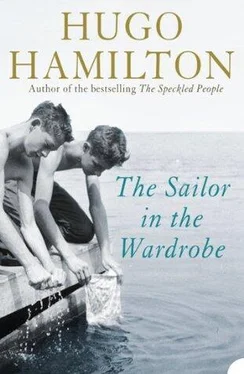My father stands at the fireplace and says nothing for a while, then suddenly breaks in to condense a number of things my mother has been trying to say into a few neat words, like a synopsis. The Gardai keep looking at her and seem to think the whole thing has more to do with her, because she is German and they have come because of Stefan, a missing German tourist. My mother shows them the card which she got from Kilfenora and the sergeant passes it on to the younger officer who looks closely at the date on the postmark and takes a note of that.
The sergeant asks what Stefan’s financial position was when he left our house and my mother says he must have run out of money by now, which is why they are so worried, because he hasn’t written home looking for any money either. My father adds that he lived on very little in his student days, but nobody can live on what Stefan had. The sergeant then tells my mother to sit down as if it’s his house and she is the guest. He explains that the Gardai will do their best to try and locate Stefan, but there is no reason to be alarmed at this early stage and they don’t want to refer to him as a missing person as yet. The Gardai in the West would be keeping an eye out, he said, and in the meantime, it would be no harm to have a description. So then the Garda with the notepad sits down on a straight-backed chair in order to take down the details.
Everyone tries to remember what Stefan looks like and what he wore when he was leaving. My mother begins to say that Stefan is tall like his father. He’s got a friendly face and brown eyes, like his mother. My father knows what the Gardai are looking for, so he begins to give them a detailed description of Stefan’s rucksack, but then it is clear that he has never described anyone before in words like this and can’t even remember the colour of Stefan’s hair or jacket. They have to call Franz into the room, because he has the best memory in our house and can remember all kinds of dates and things that happened which everybody else wants to forget. He starts by saying that Stefan has thin legs and that he walks very fast, but the sergeant says he wants to confine it to appearances, so then Franz becomes nervous and can only remember that Stefan wore a grey jacket with a hood and blue jeans. The younger Garda says it’s exactly what they were looking for and reads back the description.
‘Tall, slim build, last seen wearing blue jeans and a grey, hooded anorak, carrying a green-and-white rucksack.’ As we listen to these words, it sounds like Stefan will never come back. It’s the description that nobody wants to hear, because it has taken all the life out of him and made him a missing person.
I’m not able to add anything except that Stefan has a mole on his back, but I know that is of no value to the police. All I can think of while the Gardai are in the house is that I am a criminal. I go through all the crimes I have committed. I listen to them in the hallway and imagine them leading me away to the squad car outside. I can already see the crowd of neighbours gathered on the street watching them drive away and me turning around in the back seat to take one more look at the house where I grew up. I have a recurring dream of this moment and imagine my mother at the door crying, saying she will bring me cake when I’m in prison.
When my mother talks about bringing people back to life, I know she is quietly thinking about Stefan. I think of Stefan out there in the West of Ireland, walking along the small roads in County Clare and Connemara, all the places I’ve been to, thinking that there is always something following him, like a shout in the air. He keeps walking and walking, but he will never get away from his own name, and his own family, and his own country. I think of him looking out at the sea, with nothing but the sound of the wind in his ears. And even though there is nobody around and he’s picked the loneliest place in the world where there is nothing for miles, he can still feel that people are after him. I think of him looking out at the Atlantic as if he’s been hunted like a rabbit and can’t turn back. He’s got no country to go back to.
The Gardai said they would leave it for another week. They told us that they would be keeping an eye out for him in the meantime, but we knew it would be impossible to find somebody who doesn’t want to be found. We thought of him like the fugitive on the television series, always on the move to a new place. People in Ireland had disappeared to places like America and Canada, so they probably understood why somebody would not want to keep in touch. My mother sat in the front room a lot, thinking it was all her fault. She was wondering about all the things that might have happened to him, making up all kinds of accidents like falling off cliffs or breaking his leg on the side of a mountain and lying there starving and unable to pull himself down to the next village. She was starting the nightmare factory again.
And then I decided I had to tell her that Stefan was trying to be on his own. I wanted to put her mind at rest and told her he wanted to get away from Germany, from his father.
‘He wants to disappear,’ I said to her.
‘What did you say?’
I could see how shocked she was to hear this. She wanted to know exactly what Stefan had said to me.
‘You better be very clear about your answer,’ she said, ‘because this is a matter for the police at this stage.’
I was not sure what I was going to tell the Gardai when they asked me. It was out in the open now. I told her that Stefan said he felt numb in Germany and maybe she felt the same when she came to Ireland.
‘He hasn’t spoken to his father for a long time,’ I told her.
‘He told you that,’ she said.
‘Not for over a year,’ I said. ‘He wants to get as far away from his home as possible and disappear. He wants to go underground.’
My mother was silent for a moment. She was afraid of this German father-and-son war, because she must have heard it all from Tante Käthe. She said she knew there was trouble at home and now she was beginning to worry that Stefan was going to be a danger to himself out there around the Cliffs of Moher somewhere.
‘He doesn’t know the Irish landscape,’ she said. ‘It’s not like the German mountains. Sometimes the wind comes up on those cliffs and picks people off like an invisible hand.’
She said she was constantly surprised by the wind in Ireland. After she got married to my father, he brought her on a honeymoon pilgrimage up to Croagh Patrick and she said she had to bend down and hold on to the rocks, otherwise the wind would have blown her down the mountain again. She was beginning to imagine the worst. She could not understand how Stefan could turn his back like that on his family, on the place where he grew up, on his own home.
‘Will he not get homesick?’ she wanted to know.
But that was exactly what Stefan was trying to be, homesick. He was trying to learn that feeling.
For a while the phone calls kept coming. My mother’s school friend was thinking of coming over to try and set up a search party, but my father said Ireland was far too big a place to start looking for somebody who might not want to be found. My mother was in tears on the phone every day, because at times they thought Stefan was dead already. Onkel Ted came out to say a special Mass. They were only waiting for the day when his body would be found and I can see it in her eyes, how heartbroken Stefan’s mother must be back at home in Germany.
At night our house is very quiet now, like a church where everyone is praying for him to return. Everybody is trying to remember him back to life again.
Then one day my mother was outraged, because she was on the phone to her friend and Käthe asked a question that seemed so thoughtless at this moment. She wanted to know if my mother had already given Stefan the ancient book from the time of Gutenberg. In other words, if Stefan was carrying the precious book with him. It seemed to my mother that Stefan’s mother didn’t even care about her own son as much as she cared about the valuable book, and if her son didn’t come back, she hoped that at least the book would be returned. My mother could not understand her. She said it was no wonder Stefan had never learned to feel anything.
Читать дальше
Конец ознакомительного отрывка
Купить книгу












